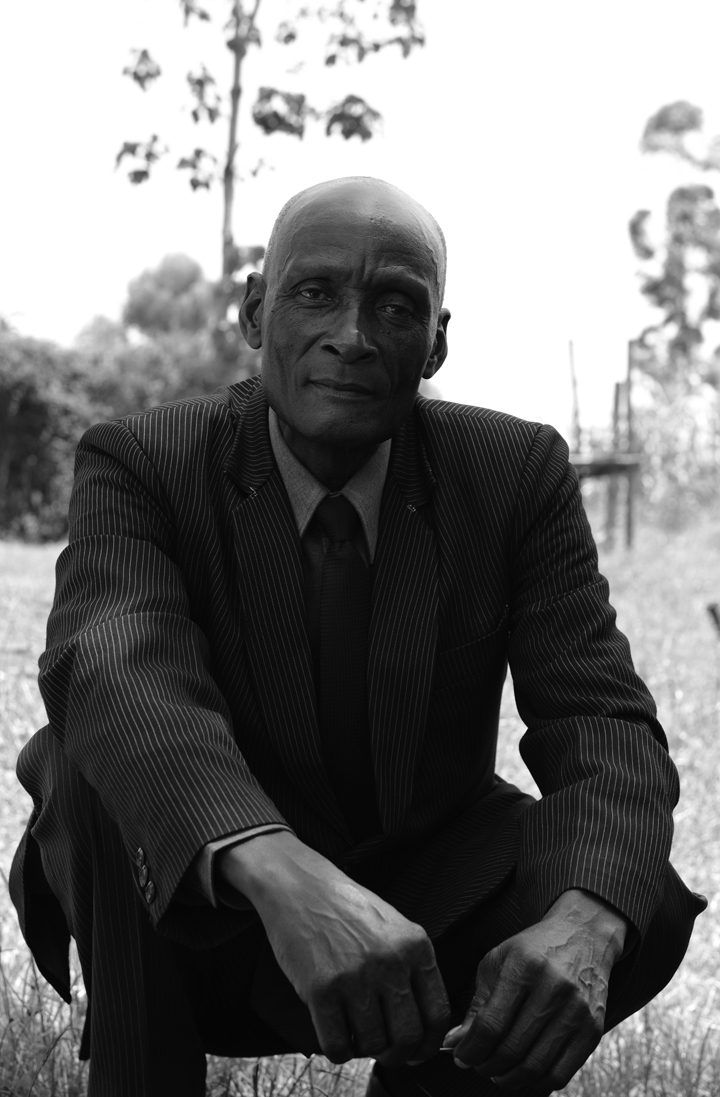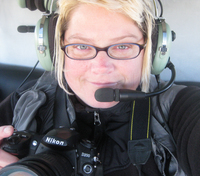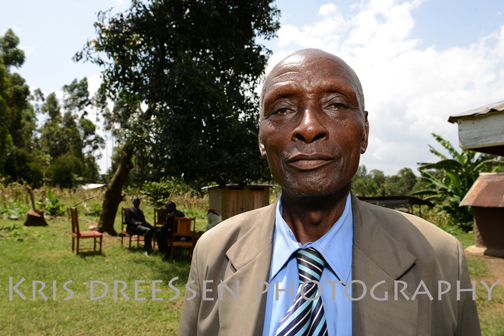
Today I spent celebrating a project with linguist Michael Diercks, of Pomona College, who is among 7 collaborators documenting small AFrican languages that until now — weren't.
10 members of Maragoli have been taping their personal stories, history, and other experiences in traditional Maragoli language, which will then be used to analyze the language.
It is a town so small it is not no Google maps, or the next town. It is amazing to be part of this, and to get to know them. This is what it is like:
•••
We wake up and have breakfast, of toast and peanut butter and butter and sausages, which taste like hot dogs, and “strong” tea, which means they cook it without milk.
Usually they make with milk and sugar.
We go in Hardley and Lydia’s truck (which looks a lot like a paddy wagon but with CEO painted on the side) to Cheptulu town, and beyond, because we need photocopies. but there is no electricity in Cheptulu, so we have to drive a bit further to Kaimosi, which turns out to be a small outpost looking area.
After, we go to cheptulu again for gas, where Michael tells me that Wesley is there as a copilot. When we get to crtain aeras, there are often police. HTey stand by the road and wave you donw, and will seek a bribe. I dont know if they dont want the hassle, especially with mzungus onboard, or if Alulu is true saying they are Christian and dont want to pay a bribe, but wesley job will be to run ahead and scout to see if there’s a cop in some areas, and if there is, come back, report and have us drive around.
There is a police so we go a different way.
When we get to a place on the road where we would turn to go to Jedereri, which I have no idea how far into the countryside it is, there is a huge pile of dirt at the entryway. I guess there is road repair, but they left the road unpassable at the entrance. Weird, but I’m used to it from Nicaagua, where we often had to maneuver or shovel to get to Ocotal.
We instead hire motorcycles that can go and are everywhere, and more flexible than cars or Matutus, which are minivans.
four bikes and we are off, and it’s so fun! I always love riding on the back of motorcycles and feeling the scenery go by. It is off road for sure, on paths to the back houses and villages off the main road, which is where most people live here. in some places there are huge ruts with red muddy dirt, a foot high and it’s just below where my feet ar erecting on the pegs. this is the only time I hang onto the back bar to brace; when my driver has his own feet down so we dont tip over.
we are passing schools. the kids holler and wave and yell “Mzungu,” which means white person. It’s an anomaly. here. the teen guys and the older men yell it too. sometimes it’s a “how are you?!”
they seem genuinely surprised and excited, and there’s also this knowledge that you are also seen as a cash bank.It’s a weird feeling.
There is this moment where we’re on the bike and we turn left when I think we are at the village, and but no, we are headed into a foreste dare and I think, i am ion kenya! I am in Kenya on the back of a bike with a linguist and we are going to see people in this remote village and this would otherwise never happen! I am living my dream! No matter how bored or scared or lonely I am, at this moment I have to remember I am living this dream! i made it happen!
If I am to be in Kenya, I want it to be this way - out in the middle of the country, geting to know people who speak a small African language and not just going on safari. that is fun,b ut that is only a sliver of Africa.
I also forget to check myself for a hot minute and think I AM badass, I made this happen. And I’m in Kenya, on the back of a motorcycle, going to a village with Maragoli people who speak a small African language, with a linguist and I’m taking photos for him and the project and contributing and seeing something very very few people get to. I’m scared, but doing it!
As we enter Jedereri, which is unknowable except people are now yelling Jambo! As if they know us and are welcoming us, as they stand on the road and at the end of the path to Benjamin's house.
The house is surrounded by maize and as we stop, a group of women in colorful wraps and skirts and men in suits come out of the house singing.
They are so … happy and full of joy … clapping and giving yips with abandon and they are coming up the small knoll at us, clapping and singing and as they come closer I drop by bag as fast as I can and unzip, grabbing my Nikon as fast as I can, to capture this moment.
In the meantime, it’s happening, and Carolyn clasps Michael’s hand and gives the biggest smile I think I’ve eve rsen. It is engulfing her face and they are coming to shake my hand, and when all 10 are by, and they turn, I think i have missed it but they are just going down to the house, slowly, slowly, and we go before them.
I video tape them singing their welcoming songs, each time I think it is over they pause, clap and then launch into another song in Margoli language.
(later learn that some are mutated, because they incorporate swahili words and they used to be all traditional Maragoli… a sign that times they are a changing).
I am standing in front of the house, looking out to the maize fields and endless sky and beyond it forest and at these people who have never met me, singing, and I choked up. This is life! This is living it!
At this point, a man in a black suit with a false purple flower in his pocket instead of a handkerchief walks down the embankement, past us to the hosue,a dn is suddenly beside eme, putting a flow run Michael’s shirt pocket. He smiles, goes over to Alulu, who is videotaping everything with his ipad, and his head is hiding, but I see the guy tuck a flowe rinto his shirt too, then laugh.
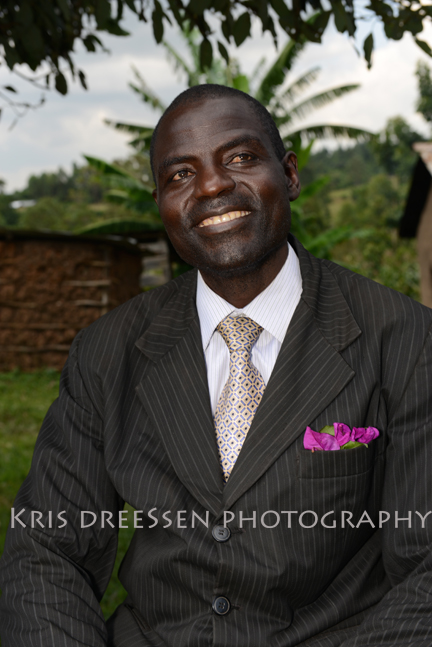
He comes to me, and smiles huge, then tucks a long pink flower like a jack in the pulpit or venus fly trip into my shirt above my shoulder.
another song, and we go inside the hosue, where we are asked to sit down. There are 2 rows of couches, facing, and2 long tables set together with a green table cloth, hand embroidered with flowers. There is a tv, which surprises me, and rows of photographs of the family high near the ceiling, ringing the room, along with the telltale deorations: ads and other posters that seem out of place. one is of two blonde kids sharing a secret. It says something about love. Another is of a chimp in a director’s chair, and it says something about how you don't know if you get married if it will be bitter or sweet.
The three men and the women come in and fill the room, and then sing again, this time coming ot us and shaking our hands and kissing us on the cheek and hugging us, “Merimbe,” - welcome.
I try to say “asante sana,” or many thinks, in Swahili. I have gotten over my fear of akin mistakes in spanish, for sure, despite all of them I make each time I open my mouth, but i am bashful with these words I have never used and are not from my typical language palette of sounds.
nothing slides of my tongue easily.
I fumble it and keep going.
We then sit down and talk about the day; we are here celebration as these people are the Maragolis who have worked for several months with Michael and a lulu on the project. They meet with Alulu who gives them several themes to talk about abut and they share something they wish in their native language. Alulu transcribes it, and then later Michael or a linguist student stars to analyze it.
they talk about marriage, history of their land andn people, personal stories … they have spent a lot of time and here, Benjamin has organized them, os it’s the most community effort. And they are proud and excited.
Michael arranged for the goat to be bought and paid for the party, as they would never have the funds to do so. It is a thank-you and also a culmination party.
Alulu went to buy a goat with them the day before and Michael didn't realize that you cant bring a goat on a local bus, so Benjamin and Henry -the retired police man and the pastor - walked it back … it must have been a good few hours.
We have tea - they bring out milked tea, and homemade tdonut-type fry bread, and boiled maize with salt. I pick up my too-big camera bag I hate that I just bought and wish I didnt, and knocked ove rmy mug, which is on the table, and send a full ache of tea onto the table.
brilliant.
the kettle being poured is also leaking on the table, so I feel less bad.
we after go outside to visit the goat that we will slaughter for the feast. everyone goes out to see it, and it is a sweet looking thing with white and brown fur and two little horns and he’s munching on grass having no idea that his life will end ion a minute or so.
Me neither.
But two guys take his feet and I realize it is going to happen and Im not sure i want to see it slaughtered, but then again if I’m eating meat, I should be keenly aware of the sacrifice that is being made by this animal for me to do so. So I dont shy away even though I do not want to see its throat slit.
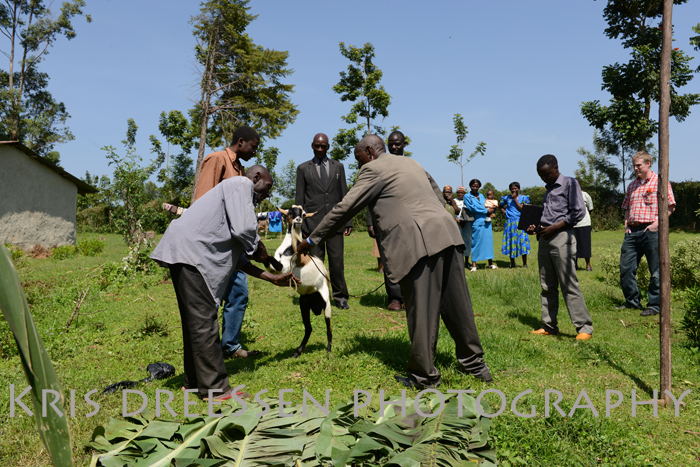
the women all go back in the house; Moses goes for a photo, and so does Alulu, and michael and I also stay to watch. I take potos.
It is, for the most part, about as quick a way for a goat I guess. They tie his feet, and when they lie it on its side, it cries in protest, but does not flail around .. I don't think it knows what is going to happen, because they would have been manhandled at some point in its short life. so why would this be different.
the guy in the suit places his foot on its leg to keep from kicking, and another holds it by the side.
The third guy take s out a very long knife - like 18 inches blade- and suddenly makes a sweeping deep swing, deep into the goat’s throat. I dont hear it but there’s movie blood spurting everywhere, so red and so bright it looks like a thriller. I can hear it draining out like a hose and that’s not a sound I want to hear again soon. I know that the goat was likely dead in 10 secons, but hearing the blood gush out make sit sound like it’s choking.
they then press on its stomach to empty it of all the blood, then take a leg and make a circular cut around its knee. Im nto sure what is going to happen, but it looks like the beginning of the butchering. one of the men says let’s go inside.I do.
I feel less terrible than I thought i would’ it was not as traumatizing, thoughI will remember always what it sounded and looked like. it was more fact of life here, and this is where my food comes from. but when we were eating, and I bit into a piece of stewed goat, I felt : do Ir early need to eat this? this goat died and was scared when it died. Do ideally need to eat this piece of meat? not that it was so sad, but that was it necessary for me to eat this, when something died for me to do so?
I will ponder that for a long time I guess. I still think everyone should see something killed if they are going to eat meat. probably kill it too, but im not sure I am up for that myself.
Before we have our lunch, I meet with there members of the Maragoli community to talk to them about their lives, the stories they decided to share and what being a part of the project means to them.
Benjamin is a retired police officer, who was moved by the government 27 years ago, as they wanted to open an administrative office and hospital on their land. It took a long time, he said, but now Jedereri feels like home. He leads the community project there, and the 10 members who are participating.
“We are teaching the current children about how the Maragolis used to be in the past,” he says. “Children have new customs. We feel it is good to teach them this way. Most of the old people do no remain. We are now the old people, telling our ways. This is a way to preserve our culture.”
I also spoke with Linet, a young wife who lost her husband after a 2-month illness. She tried to take him to the hospital, but was unable to do so. After he died, it has been difficult for her because she is alone with kids.
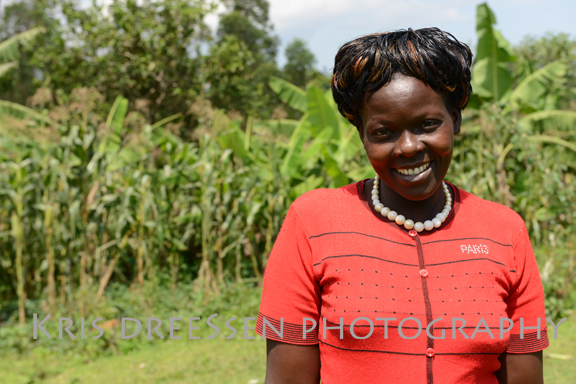
In Jedereri, food is sometimes difficult for families as well. They raise mostly maize and their staples are ugali, which is made from maize flour and water, and vegetables. The goat that was slaughtered and the chicken were very very special.
Henry is the pastor and I talked with him too. He spoke about traditions of marriage. It is changing, so fast, he says. Now, sometimes men are cooking and previously, that would be taboo. He’s proud of his culture and to be part of the project.
Everyone was so gracious and welcoming and to be able to get to know them, and their ways a little such a privilege. Here we are in a village so small it is not on Google maps, or the next town over. They have so many stories to share, that are so different and yet so common to the human experience, and without such projects such as these, would we ever hear them? Know them?
This is how I want to know Kenya.
